Quaker Musician Carrie Newcomer Finds Songs Out of the Silence
Award-winning singer-songwriter Carrie Newcomer has been called a “prairie mystic” for her meditative, poetic lyrics and folk-infused melodies. Carrie is also a thoughtful Quaker, whose faith comes through in her music, her poetry, and her podcast with author Parker Palmer.
Subscribe so you don’t miss an episode!
On this episode, Carrie shares how she came to Quakerism, how she writes from a place of meditation and silence, and, of course, she sings a few songs for us.
Share your thoughts on this episode below!
Download the transcript and discussion questions.
Discussion Questions
Discussion
- “There’s something so powerful when we sing together,” says Carrie. How does this statement resonate with you?
- Carrie says she writes songs because she has questions, “and I think good questions, deserve to be asked, and then revisited and revisited.” What questions do you find yourself revisiting?
Carrie Newcomer
Some of my best language has emerged from a silence, when I’ve taken time to be quiet, to listen. Music is just cacophony, if there’s no spaces, music is rest, and notes. And so a spiritual practice that honors the spaces, and something that is expansive, in those times a reflection and quiet.
Various
Thee Quaker Podcast. Story, Spirit, Sound.
Jon Watts
I’m Jon Watts.
Georgia
And I’m Georgia Sparling.
Jon Watts
How’s it going, Georgia?
Georgia
It’s been going good. I’ve had a little cold this week but otherwise I’ve just been chugging along.
Jon Watts
Yeah well I’m sorry you haven’t been feeling great, but glad you got a break over the long weekend. So anyway, while I’ve been busy with Maeve working on designing the Daily Quaker Message, which we’re launching in April, you got the season started off right by producing these first three episodes. Thanks for your hard work on that.
Georgia
Oh yeah, well it’s been a pleasure, but today’s episode is one you reported. What have you got for us?
Jon Watts
Today’s guest is Carrie Newcomer, and if you don’t know yet about Carrie’s work, you’re in for a treat. Carrie Newcomer is a Quaker singer-songwriter in Indiana. She released her first album in 1991 and has done another one every couple of years since, so she’s got quite a catalog. She’s also done collaborations with lots of artists including Alison Krauss, among others, and so has appeared on Grammy-winning albums, and even won an Emmy for a live concert she did on TV.
Georgia
Yeah it seems like she’s got quite a discography and a following. I listened to some of her work while you were preparing for your interview with her. I’m very folk-forward, so her music resonated with me. I’ve had her song “Sanctuary” caught stuck in my head for the past week or so and I’m not mad about it.
Jon Watts
Oh cool that’s one of the ones she shared with us, so we’re going to hear that in this episode. Yeah Carrie is super talented. And part of what drew me to her, other than just the fact that she’s Quaker, was the way that her faith gets incorporated into her songwriting. If you just look through some of her album titles like “The BeautifulGreat Not Yet,” “A Permeable Life,” and “A Great Wild Mercy” — you get the sense that you’re in for a meaningful journey with a thoughtful poet. In fact, one newspaper in reviewing her recent album, called her a “Prairie Mystic.” I think that’s apt.
Anyway, this is kind of a departure from our typical episode style because well, it’s Carrie Newcomer. I spoke with Carrie about a month ago and the conversation was so rich and meaningful, we just wanted to share some of it with you today. So we’re going to roll that. I also asked Carrie to share some songs with us, so we’;; hear a couple of those too.
Georgia
Awesome, I’m really excited to hear it.
Jon
Yeah let’s get into it!
Jon
So Carrie, thanks so much for taking some time to talk with me today. I wonder if we could start with a brief introduction.
Carrie Newcomer
Well, I’m Carrie Newcomer, and I live currently in Bloomington, Indiana, and attend the Bloomington Meeting. And I’m a musician, I’m a songwriter, a poet. I also teach, do workshops and retreats. And a podcaster. So, but primarily if you bring it right down to the center, I’m a songwriter.
Jon
Tell me a little bit about your journey with songwriting. How did you discover it as your calling?
Carrie I didn’t I didn’t come from a musical family, actually. But I grew up in this little factory town in northern Indiana. Where were at that time, all the band instrument factories were located, most of them in the I mean, the major companies were all there. So Selmer, Con, Armstrong, they were all there. Because of that, the public schools had excellent music programs with good instruments. So I encountered music through the American public school system, but it was like, Ah, this now, this is something. And so, when I was a teenager, you know, 12, I think I picked up a guitar. I kind of fell in love with the singing poets, the people who were writing songs that had stories and poetry involved. So I picked up the guitar, learned my first three chords, started writing my first really drippy songs. And never really stopped.
Yeah, music was always a calling, though, I think just creative living. So, I think I was kind of born, to sing, born to create something to, to lean into the arts and the creative expressions in one way or another.
Jon
Thank you, I can I can really relate to that. Yeah, creative life is more challenging in some ways, and also deeply fulfilling.
Carrie
Yeah, now, I didn’t go to school for music because I wasn’t ready at that point, to risk the thing I loved the most. You know, I think sometimes we get ready to risk the things that we love the most, because if it doesn’t work out, it would actually matter. And so I went to school for visual art because I was, you know, I loved that too, and I was chalking up all the safe and secure jobs, you know, options. I might have your visual art, check, folk singing check, you know, just kind of, you know, this, go down the line on that.
But I did get through college, you know, working all the odd jobs you do, but also singing I was singing in coffee houses and clubs and bars and bowling alleys. I think I, you know, I think I played garage sales. I mean, I just kind of played everywhere. After I graduated, you know, music was calling, it was really where my heart and my soul was, was being led. And so I followed and not really knowing where that would take me. I mean, I had no idea what that could look like. I didn’t know anyone who’s a full time musician, or a songwriter. And I was living in the middle of Indiana. But I followed, and all these years. It has taken me such interesting places. I mean, challenging. Yeah, I mean, there have been times when the prayer was it, please, if I can do anything else give me a clue and know that I might maybe do something else that was a little easier. But no, it was always it always called me and always called me back and it was a spiritual calling, as well as a vocational calling.
Jon
Tell me tell me a bit about your spiritual background. I know that you are a part of a Quaker meeting now, but I know that hasn’t always been true. How did you come to find Quakerism and what spoke to you about it?
Carrie
I think I think I was always a seeker. You know, I was I was a little kid that asked the wrong religious questions that would make people uncomfortable. Growing up my mom was raised Catholic, my dad was raised Protestant, they didn’t know what to do with us. But at a certain point, they started taking we went to a local Methodist church that was close by which has, at that time had a very dynamic youth pastor who was like really into you know, the Gospels are about justice and they’re about care of other you know, it really resonated with me and so it had us working in the soup kitchens and reading you know, Martin Luther King and Gandhi and you know, so it was really very influential on me, but then I when I went to college, you know that that you kind of have to walk away until so you can when you come back you come back because you want to be there.
But I ended up for quite a while at Goshen College, which is a Mennonite College, one of the traditional peace churches. And one of the things that if you went to Goshen College you needed to do was at least a semester, six months of service, you know, kind of like Peace Corps service, but they would set you up. So I went to Central America, and lived there in Costa Rica. And while I was there, now this is before it became an eco tourism place, so I had a holiday and we had heard there was a Quaker community up in Monteverde up in the in the rainforest.
So we, you know, took a train as far as it would take us then we got on a bus as far as it would take us. Somebody gave us a ride in a truck and then and then we walked into the rainforest and stayed at this little bed and breakfast that only scientists really stayed at at that time. But there was a pretty thriving Quaker community in the rainforests. So I went to my first Quaker meeting, in the middle of a rainforest, and there in the silence was an unprogrammed meeting. So it’s silent worship.
And something in my heart just went, Ah, yes. This is it, this feels like home. Something about this feels so right. That idea of not just talking at God, you know, there been a lot of, you know, praising and asking and, you know, all the talking at God we do, or at at the light, or whatever you call the great luminous in the, in the cosmos? Yeah. So we do a lot of talking at it. But it was this moment where it was encouraged to listen, listen to the God all around us, there in the rainforest to listen to the light within us. What did that teacher have to say, to listen and be still together as a community.
And so when I got back, you know, I started really seeking out Quaker communities and and eventually, when I moved to Bloomington, there was a pretty vibrant meeting at the time I moved to Bloomington. And learned more, you know, like, what, what are all you know, what is this all about? What are the testimonies what are the values? What is consensus all about, these beautiful phrases that people would say, the elders, you know, who still did a little of that old style Quaker speak, you know, that I just love as a poet, you know, like, when, when someone would say something and it would really go right to your heart, you know, someone would say, you know, friend, ye speak to my condition, and I go, Yeah.
Jon
That’s a beautiful story. I was just in Monteverde. A few months ago for my honeymoon.
Carrie
Really? I have no idea what it’s like now, but like I said,
Jon
It was a lot of eco tourism. It’s it. Yeah, we did, you know, zip lines through the canopy, like time tours of the wildlife and but we did go to the meeting. And it’s an it is a gorgeous, gorgeous space. Super magical.
Yeah, so if I’m getting the timeline, right, you you were sort of well into your journey with music and songwriting when you started your Quaker journey or maybe they sort of developed together but I wonder if there’s a relationship there is. As a musician who works with sound for a living what’s the relationship between working with sound for a living and sitting in silence for your your worship practice?
Carrie
Some of my best language has emerged from a silence, when I’ve taken time to be quiet, to listen. Music is just cacophony, if there’s no spaces, music is rest, and notes. And so a spiritual practice that honors the spaces. And something that is expansive, in those times a reflection and quiet. You know, that’s been super important to me as a person, but also I think, as a musician, also, as a professional musician, you know, I mean, working in you know, I started out working with a regular rec, I mean, it was record company stuff in the know, kind of keeping my head straight on, what, what was important, and how to maintain a certain kind of integrity. In everything I do, and everything I speak, and everything I sing, you know, that’s was all very important to my development as an artist, and as a professional, and as a person.
Jon
I’m curious about your songwriting process. Is there a relationship between listening for a message in meeting for worship and listening for a song that wants to be written?
Carrie
I have a practice of meditation on my own, you know, of contemplative silence, my own personal practice. And songs have emerged out of that a lot. Yeah, there have been some, you know, like, you know, that thing that happens, sometimes when someone stands in a unprogrammed meeting, and they say three sentences, and it goes straight to your heart, it was exactly what you needed to hear. Or it also set your head sideways, like what? I have to think about that. So there have been songs that have really grown out of those kinds of encounters, with ideas with language, with just the listening, and being willing to be open and curious.
My personal process often starts with language. I do a lot of writing, you know, like journaling, and poetry, I write a lot of poetry, a lot of songs will emerge out of the poetry, essays, and short stories. It doesn’t come directly — I don’t write lyrics, and then put music to it — but I’ll have language kind of rolling around. And then when it’s time to bring it to the music, they kind of happen together.
Jon Watts
Yeah, so you want to share an example with us here? Share a song.
Carrie
Um, well, I will do a song here. I’ve done quite a bit of work with another Quaker author, Parker Palmer. And we did a couple spoken word and music programs together that we created. And this song was written for one of those spoken word music programs. So we were creating a show, and something had happened in my home state, politically, that just was heartbreaking. It was just heartbreaking to me. And I was on the road and I was, you know, sitting at a gate, and I was looking around with, you know, here’s the people headed home to Indiana, but I’m looking around and this thought came to my head, like, Are you one of them, you know, in terms of this heartbreaking legislation that had just come through, and that broke my heart further? No, it’s like, oh, it’s us. It’s not them.
And I wrote Parker and I asked him, you know, what do you do? What does a person do when they’re feeling personally or politically heartbroken? He wrote me back and he talked about sanctuary, this idea that there is time when we go out and we march and we we do action hope is action, you know, and but there are also times when we we rest in the arms of an individual or a community and gather our strength and our courage and he talked about Brown Chapel, which was one of the places during the Civil Rights Movement people would gather and sing before the hard days ahead. Talked about Quaker community and after I read that letter I wrote this song so it’s called Sanctuary.
Will you be my refuge
My haven in the storm
Will you keep the embers warm
When my fire’s all but gone?
Will you remember
And bring me sprigs of rosemary
Be my sanctuary
‘Til I can carry on
Carry on
Carry on
This one knocked me to the ground
This one dropped me to my knees
I should have seen it coming
But it surprised me
Will you be my refuge
My haven in the storm
Will you keep the embers warm
When my fire’s all but gone?
Will you remember
And bring me sprigs of rosemary
Be my sanctuary
‘Til I can carry on
Carry on
Carry on
In a state of true believers
On streets called us and them
It’s gonna take some time
‘Til the world feels safe again
Will you be my refuge
My haven in the storm
Will you keep the embers warm
When my fire’s all but gone?
Will you remember
And bring me sprigs of rosemary
Be my sanctuary
‘Til I can carry on
Carry on
Carry on
You can rest here in Brown Chapel
Or with a circle of friends
Or quiet grove of trees
Or between two bookends
Will you be my refuge
My haven in the storm
Will you keep the embers warm
When my fire’s all but gone?
Will you remember
And bring me sprigs of rosemary
Be my sanctuary
‘Til I can carry on
Carry on
Carry on
Carry on
Jon
Thank you. After the break, I talk with Carrie about the relationship between spirituality and social change, and where art fits in.
First, here’s a message brought to you by New Garden Friends Meeting.
Georgia
New Garden Friends Meeting in Greensboro, North Carolina is now accepting applications for a full-time pastoral minister.
Founded in 1754, New Garden Friends is a progressive, open, and affirming faith community that emphasizes peace, social justice, and the belief that there is that of God in everyone.
The New Garden community values the Quaker belief in continuing revelation and welcomes light from many traditions, including, but not limited to, Christianity and the Bible.
The pastoral minister will provide leadership through inspired preaching, compassionate pastoral care, guidance for staff, and support of community service and social justice efforts.
Warmth and humor are appreciated.
New Garden offers a competitive salary, a strong benefits package, and relocation expenses. Membership in the Religious Society of Friends is preferred but not required. To apply, send a resume or profile, a one-page statement of faith, and a cover letter to NGFMSearch@gmail.com. You can also find that address is in the episode show notes.
Applications will be accepted through April 15, 2024 or until the position is filled. Learn more about New Garden Friends Meeting at ngfm.org.
Jon
After reading about you in this past week, and sort of engaging with your work, one thing that really strikes me is this, this thing that Quakers always wrestle with is the sort of balance between the mysticism which pulls us inward and in relationship with God. And this engagement with the world, this, you know, vision for what the world could be, and how much work it’s going to take us to get there. I’ve really seen you sort of holding those two pieces in your work. And I wanted to ask you, especially after the story you just shared about sort of being in touch with the legislation of your state and the impact it was going to have. And then you know, and then going deep and making this piece of art. Want to ask you about that social change? Sort of what what draws you into working for social change as a Quaker and what role do you think that music has to play in that?
Carrie
The mysticism of Quakerism definitely drew me, as well as the Quaker witness for justice in the world, that idea of balancing the two, you go deep. You go to the well, you ground yourself and expand through that, that spiritual practice, and contemplative time and relationship to the mysteries. And sometimes you really need grounding.
I mean, we live in such challenging times, such divisive times, and there have been hard challenging times that Quakers have have navigated through history. But this is a very challenging time — socially, politically, for our planet. I have written songs that are meant to be sung like anthems or you could walk and march with this song. I didn’t do that at first. I didn’t write songs that you could sing along with. I did more the singer-songwriter thing. But I remember at a certain point, like, there’s something so powerful when we sing together.
I read a study that said, when we sing together, our hearts sync up, I mean, our hearts literally start to beat together if we sing together. it’s like three and a half minutes of empathy. It’s like we, we recognize one another at a time when, you know, we’re being encouraged to, to not recognize one another as as kindred. You know, so that’s really been important to me. A lot of times I’m writing about human condition, and human journey, and that process of going deep.
Who am I? What? What do I value? What do I love? Where is hope found? Where is it sustainable? I’ve always said, I’ve never written a song because I had an answer. You know, I write songs, because I have questions. And I think good questions, deserve to be asked, and then revisited and revisited.
There’s a lot of sorrows in the world, there’s a lot of troubles in this world. And it can feel overwhelming, how do you how do you get your arms around that? And my response to that is always bring it in, bring it bring it human size. What can I do in my life today, in this moment? How, how do I bring in the better kind of world in just my every interaction? And, and that makes it doable. You know, sometimes love gets really big, but kindness, kindness is really doable. I mean, like it I think of kindness as being like the country cousin to love. You know, it will kind of like hang out in the kitchen and wash the dishes and nobody asked it to. It’s human sized.
So, a lot of times, you know, I’m, I’m writing from, you know, this, this sense of, how do we bring it human size to a place where we can each make a difference in the world?
Jon
I really like your sort of framing of it as, as a song can be three and a half minutes of empathy and, and sort of bringing, bringing those big concepts of, of love, and maybe things like world peace and things like that into a much more sort of doable, conceivable notion. I’m reminded of some conversations I’ve had with Quakers about this, you know, this big idea that we have that the kingdom of God or the kingdom of heaven, or the beloved community, or whatever you want to call it is, is possible, you know, it’s up to us, we could make it happen. And it sounds like you’re, you’re yeah, and you’re talking about the whole species, and you’re talking about nation states and stuff like that, but, but Quakers will also say and remind each other, that it’s, it’s coming, and it’s already right here, like we can already access it right now.
Carrie
I talked about the elders that were in my meeting, you know, peace, love, truth and justice, you know, in its final and completed form, will most likely not happen in my lifetime. It might, you know, we’re gonna get a ways down the road, but in its final, completed form, will most likely not happen in my lifetime. And so I remember having a conversation with John Paul Lederach, who has done incredible work in nonviolent conflict resolution, all over the world in some of the most conflicted places on the planet. And he says, because of that knowledge, my work for the better, kinder world has to be an orientation, not just a destination. And there’s a sense of faithfulness in that, that I am a piece of the history. It’s the orientation of my life, not just the destination that I’m trying to bring in.
So and then I, you know, I think there’s something really powerful in that balance, again, going back to the balance of the the inner work and the outer work that we do in the world, how important and that they overlap. You know, the idea you know, I play in spiritual communities I play in seminaries. And you know, I don’t know the nuns found me at a certain point, communities of sisters, and then I play in bars and secular circumstances, and I don’t change my show. You know, I don’t know that idea that there’s a division between the inner and the outer work we do in the in the world that that, for me, they they need to overlap they need to be part of one another and expressed as one another.
Jon
I love that invitation. I don’t I think rather than making sense that it is the type of thing that will work on me. Now that I’ve heard it, do you have time for one more song?
Carrie
I do, I do. Let me quick tune it up here. I’ll just go ahead and do the “Gathering of Spirits” because it it’s picked. I have 20 albums, you know. And so the other songs that kind of came in into the world came into my life and then they passed because their time had passed, you know? For me anyways in terms of singing them, but then there are songs that have become old Friends, and they kind of keep unfolding in one way or another. So this is a song that’s an old friend for me. And you know, there’s a line there’s a festival Friends so there’s there’s there’s a Quaker word reference right there so.
Let it go my love my truest
Let it sail on silver wings
Life’s a twinkling and that’s for certain
But it’s such a fine thing
There’s a gathering of spirits
There’s a festival of friends
And we’ll take up where we left off
When we all meet again
I can’t explain it
I couldn’t if I tried
How the only things we carry
Are the things we hold inside
Like a day in the open
Like the love we won’t forget
Like the laughter that we started
And it hasn’t died down yet
Oh let it go my love my truest
Let it sail on silver wings
Life’s a twinkling and that’s for certain
But it’s such a fine thing
There’s a gathering of spirits
There’s a festival of friends
And we’ll take up where we left off
When we all meet again
Oh yeah now didn’t we
And don’t we make it shine
Aren’t we standing in the center of
Something rare and fine
Some glow like embers
Like a light through colored glass
Some give it all in one great flame
Throwing kisses as they pass
So let it go my love my truest
Let it sail on silver wings
Life’s a twinkling and that’s for certain
But it’s such a fine thing
There’s a gathering of spirits
There’s a festival of friends
And we’ll take up where we left off
When we all meet again
East of eden
But there’s heaven in our midst
And we’re never really all that far
From those we love and miss
Wade out in the water
There’s a glory all around
And the wisest say there’s a thousand ways
To kneel and kiss the ground
Oh let it go my love my truest
Let it sail on silver wings
Life’s a twinkling and that’s for certain
But it’s such a fine thing
There’s a gathering of spirits
There’s a festival of friends
And we’ll take up where we left off
When we all meet again
And we’ll take up where we left off
When we all meet again
Georgia
Thank you for listening and thank you to Carrie Newcomer coming on the show. Carrie’s newest album is “A Great Wild Mercy.” Carrie also hosts a podcast with Parker Palmer called The Growing Edge. Find out more about both on her website, CarrieNewcomer.com. We’ll include the link on our show page.
Today’s episode was reported by Jon Watts and edited by Jon and me, Georgia Sparling.
Jon also wrote and performed the music.
Studio D mixed the episode and Your Moment of Quaker Zen was read by Grace Gonglewski.
Thee Quaker Podcast is a part of Thee Quaker Project, a Quaker media organization whose focus is on lifting up voices of spiritual courage and giving Quakers a platform in 21st century media.
If you want to support our work, please consider becoming a monthly supporter. Every contribution expands our capacity to tell Quaker stories in a fresh way and makes this project more sustainable!
Visit QuakerPodcast.com for more information.
And now for Your Moment of Quaker Zen.
Grace Gonglewski
Rex Ambler, 2001: “Inhabiting on the conscious part of ourselves we lose touch with the unconscious part. Living in our heads we become estranged from our bodies, thinking of them only as material things that exist for our use or enjoyment. Our minds therefore need always to be busy, to be occupied, trying either to control the world or to squeeze some pleasure from it. This modern mind of ours does not like to be quiet, still, receptive. It does not like to be empty. When emptiness or silence threatens it seeks to protect itself with images, words, and sounds.”
Georgia
Sign up for daily or weekly Quaker wisdom to accompany you on your spiritual path, just go to DailyQuaker.com. That’s DailyQuaker.com.
Recorded and edited by Jon Watts and Georgia Sparling
Original music and sound design by Jon Watts (Listen to more of Jon’s music here.)
Supported by listeners like you (thank you!!)
Image from Carrie Newcomer
Referenced in this episode:
- Learn more about Carrie’s music, sign up for her newsletter and more on her website.
- Listen to The Growing Edge podcast with Carrie and Parker Palmer.
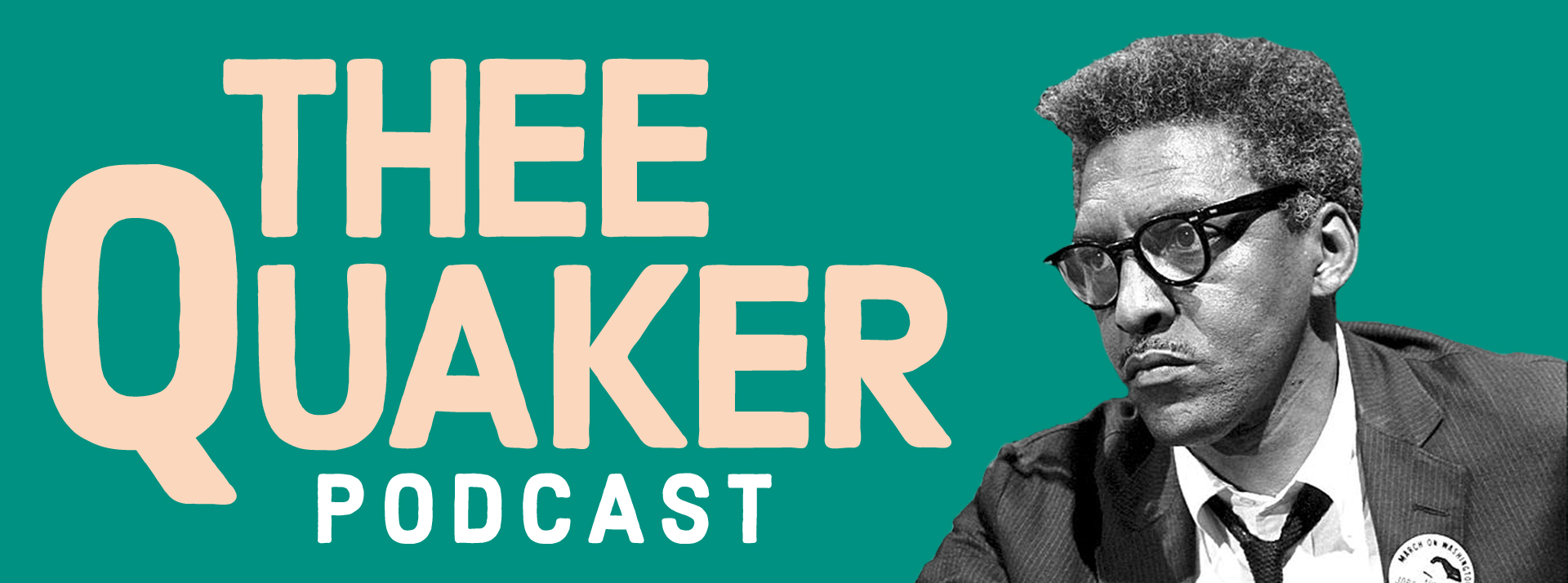

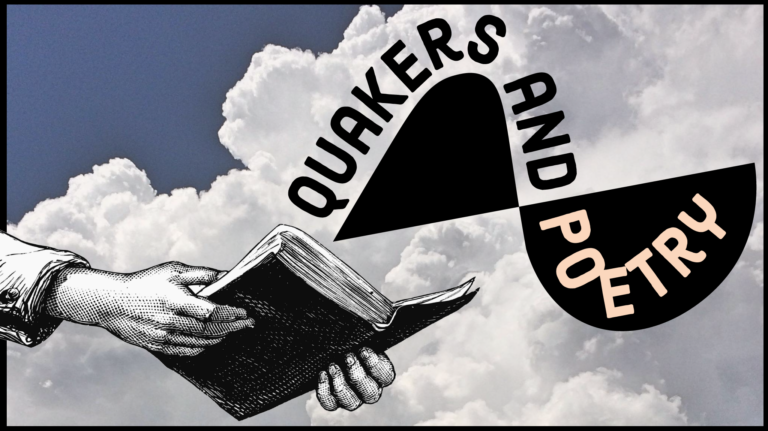
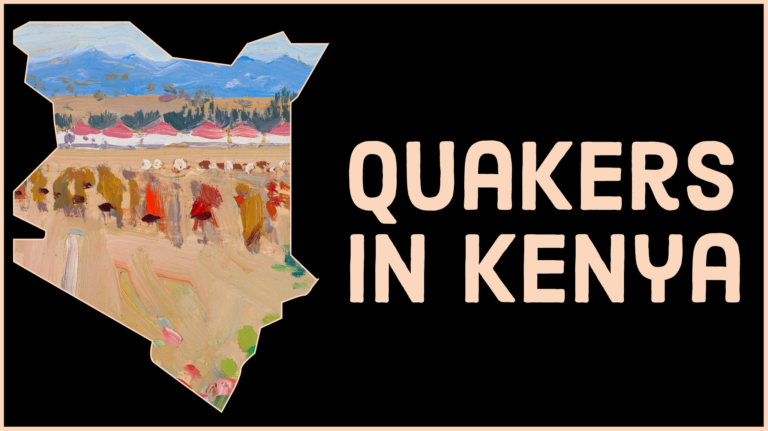
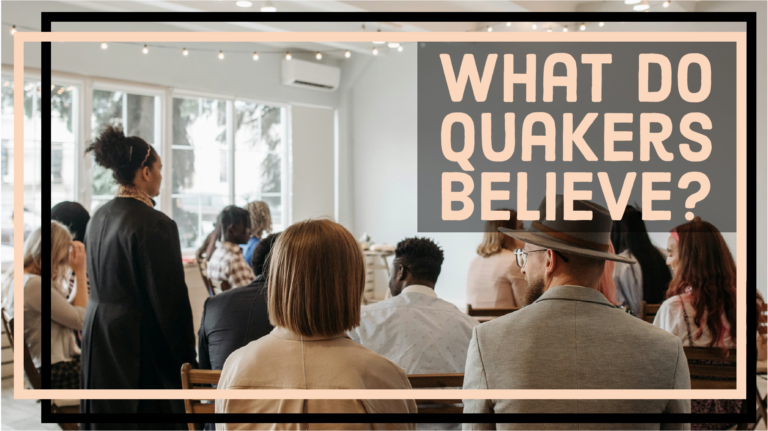
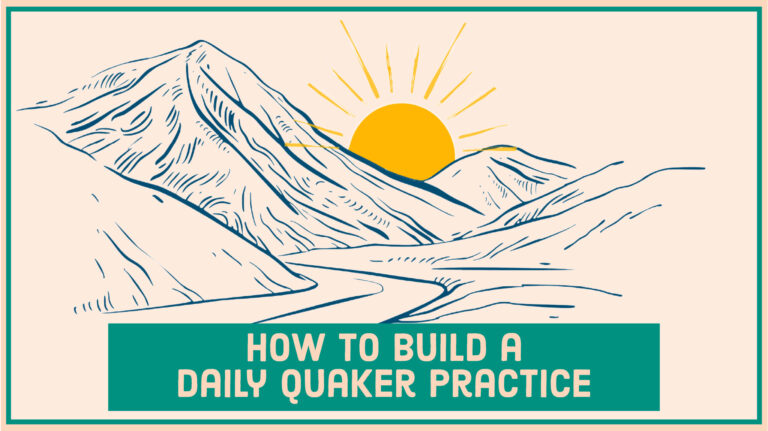
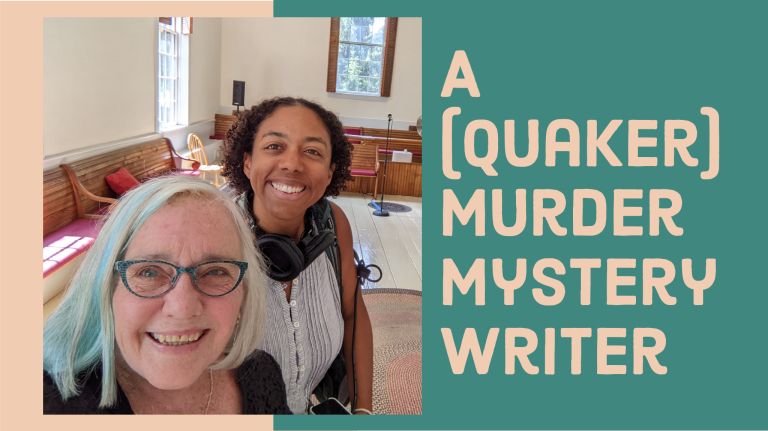
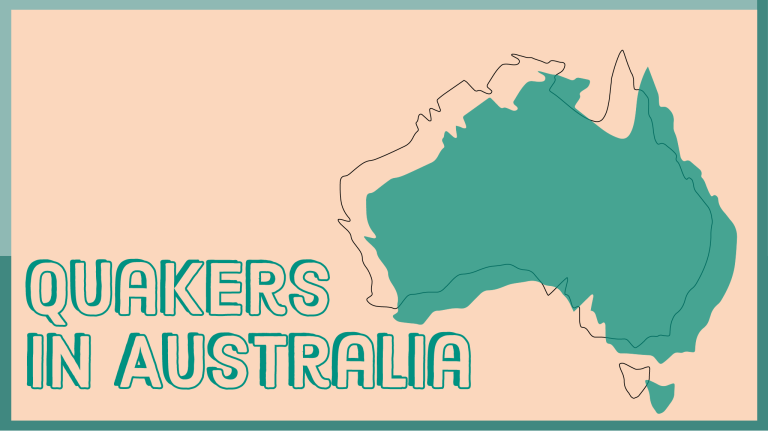
2 Comments